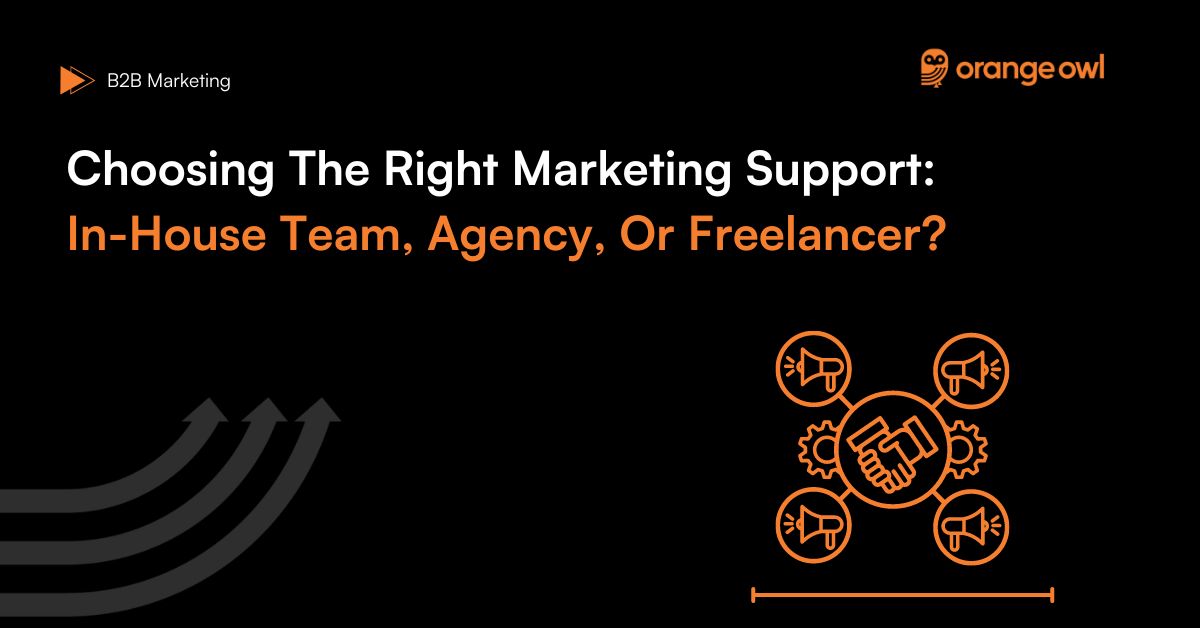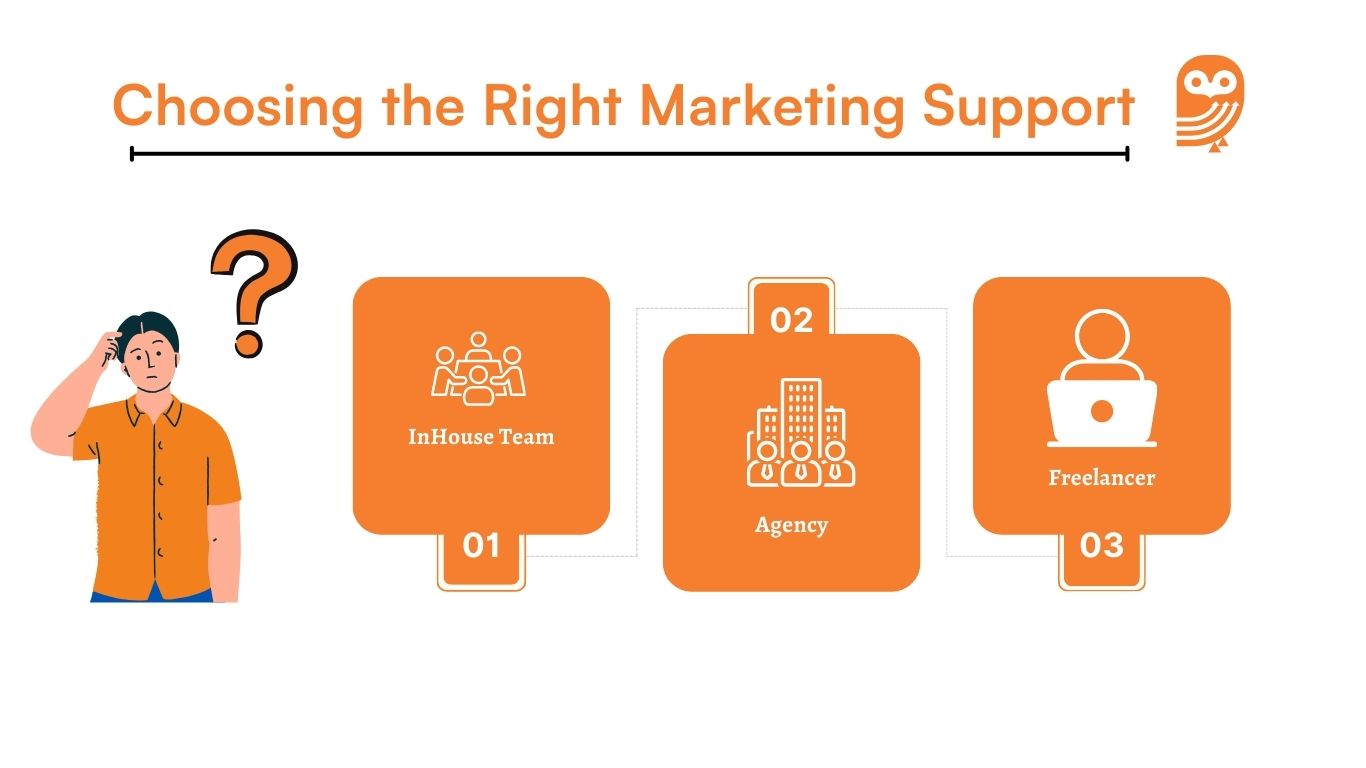Choosing the Right Marketing Support: In-House Team Vs. Marketing Agency Vs. Freelancer?
Vivek Goel
February 4, 2025

Table of Contents
In the evolving landscape of B2B marketing, companies often grapple with deciding the best way to handle their marketing needs. It’s always In-House Team Vs. Marketing Agency Vs. Freelancer. But, whether it’s hiring freelancers, engaging an agency, or building an in-house team, each option offers unique benefits and challenges. Understanding when to employ each of these can be crucial for leveraging your company’s marketing potential effectively.
Choosing the Right Marketing Support: In-House Team Vs. Marketing Agency Vs. Freelancer

The In-House Marketing Team – Benefits and Challenges
Advantages of an In-House Team: An in-house team offers dedicated personnel who are deeply integrated with the company’s culture and goals. This can lead to swift decision-making and a high level of control over marketing activities. Team members are exclusively committed to your business, fostering a focused approach to branding and marketing strategies.
Challenges of an In-House Team: The primary challenge with in-house teams, especially for small to medium-sized businesses, is the high cost of hiring multiple specialists. Modern marketing demands a range of expertise including SEO, content creation, social media strategy, digital advertising, and analytics. Assembling a team that covers all these bases is not only costly but might also be underutilized if the demand for their skills isn’t continuous.
Balancing with Freelancers and Agencies: For many companies, a hybrid approach often works best. They might retain a small in-house team for core marketing activities while outsourcing specialized tasks to freelancers or a comprehensive marketing agency.
Benefits of Working with a Marketing Agency
Choosing to work with a marketing agency can bring multifaceted benefits to a business, especially when the needs are complex and dynamic. Below are detailed scenarios and examples illustrating the specific advantages of partnering with a marketing agency:
1. Comprehensive Service Needs
When your marketing demands are diverse and require a range of services that need to work cohesively, an agency is ideally suited to meet these needs.
- Scenario: Imagine a B2B tech company launching a new software product. The launch requires synchronized efforts across market research, branding, digital marketing, public relations, and customer engagement strategies. An agency can coordinate all these aspects to ensure a unified approach to market entry, significantly enhancing the launch’s success potential.
2. Long-term Strategic Planning
Agencies provide ongoing strategic insights that help shape and guide marketing efforts over an extended period, ensuring that marketing evolves in line with business goals.
- Example: A manufacturing firm looking to expand into new geographic markets could benefit from an agency’s expertise in strategic market analysis, entry strategies, and localized marketing plans, providing a sustained approach to expansion.
3. Access to Latest Technology and Tools
Agencies invest in advanced tools that enhance the efficiency and effectiveness of marketing campaigns, from analytics software to automation tools and AI-driven platforms.
- Scenario: For a company needing to improve its online presence, an agency can utilize SEO tools like SEMrush, CRM systems like Salesforce, and automated marketing platforms like HubSpot to streamline operations, track performance, and drive engagement more effectively than the company might manage on its own.
4. Experience Across Industries and Markets
Having worked with clients across various sectors, agencies bring a broad perspective and innovative ideas that have been tested and refined in different markets.
- Example: A startup in the renewable energy sector can leverage an agency’s experience with past clients in similar niches to accelerate its market penetration and adoption through proven strategies.
5. Continuous Optimization
Agencies operate with a mindset of continuous improvement, regularly analyzing performance data to refine and optimize marketing strategies.
- Scenario: Consider a B2B service provider whose initial ad campaigns are underperforming. An agency can continuously test different ad formats, targeting techniques, and messages, then use data analytics to adapt the strategy to focus on the most effective elements.
6. Risk Mitigation
Marketing agencies ensure compliance with industry standards and help reduce the risk of errors and non-compliance in marketing practices, which is crucial in regulated industries.
- Example: A pharmaceutical company can rely on an agency to manage its marketing while strictly adhering to healthcare advertising regulations, thereby avoiding potential legal issues and ensuring all communications are compliant.
7. Scalable Service Offerings
Agencies can scale their services up or down based on client needs, providing flexibility in resource allocation without the fixed cost of hiring more staff.
- Scenario: During a product launch, a business might need to ramp up its marketing efforts significantly. An agency can temporarily increase its dedicated resources to support this peak period, then scale back down as the product gains market traction.
Each of these benefits highlights how a marketing agency can serve as a powerful extension of a business’s own capabilities, providing expertise, technology, and strategic guidance that are difficult to match through other means. Whether managing complex projects, navigating market expansions, or simply ensuring that marketing operations are as effective and up-to-date as possible, agencies offer valuable support that can make a significant difference in a company’s marketing success.
When to Choose a Freelancer:
- Specialized Tasks: When the project requires niche skills for a short period, such as a PPC campaign or a specific graphic design project.
- Cost Efficiency: When budget constraints make it less feasible to hire a full-time specialist or engage a full-service agency.
- Flexibility: When needing to scale marketing efforts up or down quickly, without the commitment of a full-time hire.
Integrating In-House and External Marketing Efforts
Strategic Division of Labor: Businesses can optimize their marketing approach by maintaining a core in-house team that handles day-to-day marketing activities and overarching strategies. External experts such as freelancers or agencies can then be brought in to manage specialized projects or overflow work that goes beyond the capacity or capability of the in-house team.
Example Integration Strategy: A tech startup may employ an in-house marketing manager and a content creator but rely on a digital marketing agency to manage SEO and PPC campaigns. They may also occasionally hire freelancers for additional graphic design work during product launches or branding updates.
Conclusion: In-House Team Vs. Marketing Agency Vs. Freelancer
The decision between building an In-House Team Vs. Marketing Agency Vs. Freelancer should be guided by a strategic evaluation of your business needs, budget constraints, and long-term marketing goals. For many, a hybrid approach that combines the strengths of all three options allows for flexibility, scalability, and a balance between expertise and cost. This blended model ensures that businesses can adapt to changing market conditions and business needs without compromising on the quality or effectiveness of their marketing efforts.
FAQs
An in-house team offers dedicated personnel who understand your company’s culture and goals, leading to quicker decision-making and a focused marketing strategy. An in-house team can swiftly adapt marketing campaigns based on immediate feedback, resulting in timely and relevant content. However, building an in-house team without considering costs and necessary expertise can lead to high expenses and underutilized talent. For example, hiring multiple specialists for tasks that don’t require full-time attention leads to high payroll costs without proportional returns.
Agencies provide comprehensive services and strategic insights, helping businesses manage complex marketing needs efficiently. For example, a tech company launching a new product can use an agency to coordinate market research, branding, and digital marketing, ensuring a successful launch. However, choosing an agency without clear objectives can lead to misaligned goals and ineffective campaigns. Hiring an agency without specifying needs results in generic campaigns that don’t align with the company’s brand or objectives.
Freelancers offer specialized skills for short-term projects, providing flexibility and cost-efficiency. A startup, for instance, can use a freelance SEO expert to improve its search rankings, achieving significant results without long-term commitments. However, relying too heavily on freelancers without coordination can lead to inconsistent messaging and missed deadlines. Hiring multiple freelancers without clear communication results in a disjointed marketing strategy with inconsistent brand messaging.
Balancing in-house efforts with external support ensures that all marketing needs are met efficiently. For example, an in-house team can handle daily tasks while an agency manages specialized campaigns, leading to a well-rounded marketing strategy. However, solely relying on an in-house team for all marketing needs can be costly and may not cover all necessary expertise. An in-house team might struggle to keep up with evolving marketing trends and lack the specialized skills needed for complex campaigns, resulting in missed opportunities.
A hybrid approach, combining in-house teams with freelancers and agencies, offers flexibility, scalability, and a balance between expertise and cost. For example, a tech startup may employ an in-house marketing manager and content creator while relying on an agency for SEO and PPC campaigns. This allows the business to maintain a core team for daily operations and leverage external experts for specialized tasks, ensuring a comprehensive and cost-effective marketing strategy.
